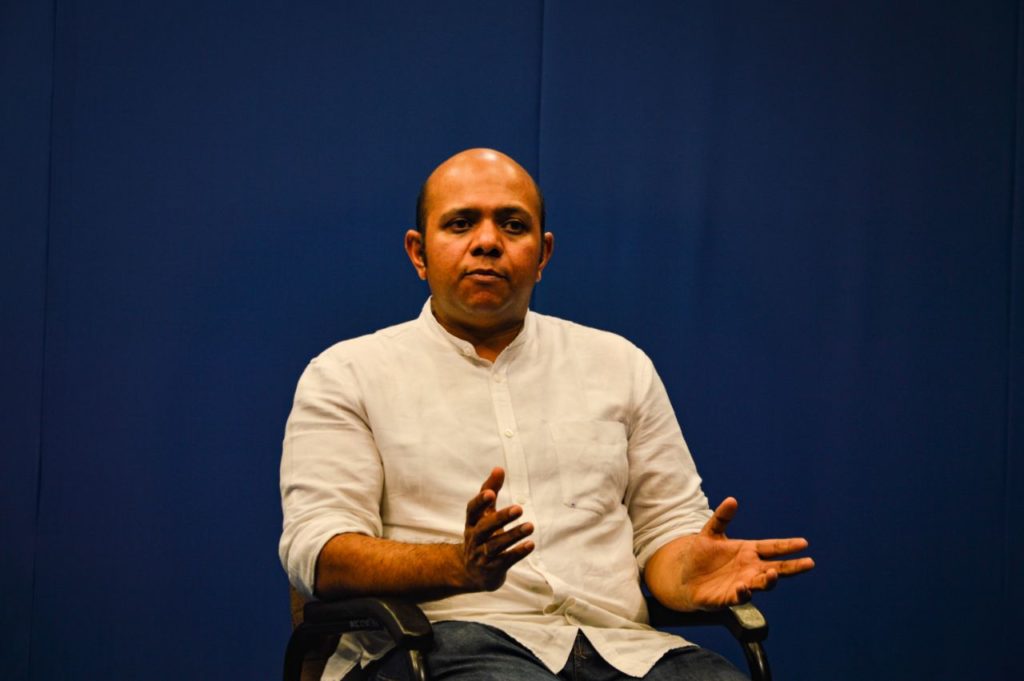
“If you are out doing a good piece of journalism, the chances of it living longer is in the many people interested in the story getting killed.”
The year was 2001. A young man said his goodbyes to this little town of Manipal and set out on a journey, with dreams to chase and ambitions to fulfil. Eighteen years later, the man returns. This time, not as a student running to make it to a morning lecture, but as a guest of honour at his very own college fest.
Vinod Kizhakkeparambil Joseph is an Indian journalist, editor and magazine founder. He is currently the executive editor of The Caravan, “India’s only narrative journalism magazine”. Mr Jose is an alumnus of School of Communication, Manipal. He is noted for his work as a reporter in the 2001 Indian Parliament attack, and his exclusive interview with Mohammad Afzal Guru while the convict awaited his execution inside the Tihar jail. The interview has been translated into eleven South Asian and European languages. His profile on the former Prime Minister, Manmohan Singh, for The Caravan won him the Ramnath Goenka award.
On the morning of the 9th of February— the second day of Article-19, the core media fest of School of Communication— the hyped-up crowd eagerly awaited Mr Jose’s arrival. As he sat down to address us young aspirants of journalism, we were all ears. After walking us through the early days of his career as a reporter, he gave the crowd insights about various issues and experiences including his reporting of the 2001 Parliament attack, the Afzal Guru interview and the Judge Loya case.
Commenting on the Indian media today, he demanded, “Our ranking internationally is 136. Congo, Zimbabwe and other African countries are far ahead of us. It is a shame that we have a press that is worse than that of Pakistan. The promise of India was ‘a brown man’s enlightened world’. What happened to our promise of this nation?”. The hall fell silent.
In 2009, Mr Jose was hired by the Delhi Press to relaunch The Caravan, which was discontinued in 1988. Today, as the executive editor of the magazine, internationally acclaimed for its long-form journalistic works on Indian politics and culture, Mr Jose held, “We (The Caravan) try to shout as loud as possible in our stories. And for me, editing starts from ideation. Editing does not start from the first draft. One out of ten ideas is what The Caravan considers for a cover story. And the story that gets picked up goes through a certain kind of thought process. When a colleague comes up with an idea, I always tell them: Let’s do this story in a way that for the next five years, it remains the most important work on the subject. That level of ambition helps because it justifies the time taken.”
“Our effort as a financial Caravan has been to tap into what we call ‘the decision-makers’. Our audience may be small but our audience could be very influential. They may be corporate leaders, advocates, journalists, senior research people, NGOs, think tanks or academicians. They are the people who will want to arrive at a decision by considering a holistic perspective, a holistic understanding.”
Mr Jose’s works have set new standards for narrative journalism in the country. “Narrative journalism is a very comprehensive way of doing journalism. It is done with a little more care to the facts, the characters and the people at large. It pays a lot more attention than the contemporary style of reporting in terms of the research and the background work that is required. At the end of it, it’s wearing three different hats as a journalist. The hat of a good reporter, the hat of a good writer and the hat of a good scholar.”
“Besides editing, there is the understanding that the stories need to be told in a certain way. For us, the inverted pyramid format is not the most important thing. Can we throw in elements of good story-telling that we have in theatre, in fiction, in poetry, which can be brought into non-fiction? Can we bring in tension? Can we bring in drama? Can we play characters against each other as it would have happened in the story? It could be a crime story, political story, cultural story, or business story— in all these stories, you see that there are strong elements of life and character and fiction. Be such a reporter that you look for it and you find it.”
Later in the day, Mr Jose sat down for an exclusive interview with MTTN. Although there were time constraints, we were able to pitch in a few questions. Here is an excerpt from the interview:
You have talked about knowing the difference between journalism and Public Relations when it comes to reporting. Do you think the media, as out-bringers of the truth, should take a stronger stand against the demands of an intolerant establishment? Does today’s journalism demand courage more than ever?
Absolutely. I think the foundational principle of journalism is courage. The second skill that is important is curiosity. And putting pressure on the power is the primary role of the press. Because power inherently can be very useful and can also be very dangerous. It depends on how you handle power. And the people who get elected into offices can also make the mistake of using it for the wrong reasons, can be violators of the law, can be liars, can do criminal acts. So at that point, our role is to point it out to the society at large. Our role is not to be collaborative of what the people in power want us to be. Our role is to put pressure. That pressure is only healthy in a democracy. It makes sure that there are always better leaders. And there is more accountability. That accountability corrects the leaders. That also scares the aspiring next leaders…you know, ‘there is a very difficult press as a customer and I have to satisfy them for they are the representatives of the public’. And India is changing and it is changing in a way that is moving it further and further away from its original ambitions. We have become very intolerant, in the sense that we are not being very democratic in a land of multiple interests. The press is going through a tough time. The country is going through a tough time. We need journalists and media institutions who will stand up and who will remind the people to take the compass back to the original principles of the constitution.
Responding to parallel questions by other media bodies, he explained, “Journalism serves as the first draft of history. So, if you are out doing a good piece of journalism, the chances of it living longer is in the many people interested in the story getting killed. They are not on the winning side if you ask. They are actually on the side of losers. And that should give us confidence. As journalists, our primary focus should be to bring out those facts which the power that they, never want to be out. If a story has been put through the process (of collecting the right and true facts), then whatever happens to the story thereafter, it is our job to collectively defend it and carry it to the logical conclusion. And if it happens at the expense of going to jail or death, then so be it. That is the calling of this job. We will cease to be good journalists if we don’t ask the uncomfortable questions. We can call ourselves journalists, shout at the top of our voices, but we will become at best, good PR people.”
But, while we talk about our freedom of speech being jeopardised, there is also the side of media that exploits this very freedom, be it by manipulating the public or compromising on the credibility of news. Do you think the media, to some extent, has as much responsibility as the other three estates? How important is a responsible, accountable media to a nation such as ours?
I think the problem is that journalists put out any information in a competition. But once you make sure that your facts are right and accurate, I think you should go ahead and publish it or broadcast it. From what I understand, The Caravan is one of the only organisations that has a fact-checker in their newsroom. Unfortunately, we really don’t have a culture in India where we acknowledge our mistakes and publish the corrections. In that way, we are killing our own space and our own respectability as journalists.
Later in the talk, he added, “Then comes the crisis of credibility. Let’s take the example of the American mainstream news organisations in the context of war against terror. Let’s say, the Iraq war. Almost all media houses did a huge build-up of the news. You know, The New York Times published stories after stories on their front page which later turned out to be lies. One of their journalists by the name Judith Miller, she was putting forward false stories, for which she not only had to apologize but she also lost her job. And they have tried to recover from this credibility crisis. I think what is happening in India, which is similar to the U.S situation is that Modi’s Prime Ministership is going to be the crisis time in terms of credibility. The public is watching what news is censored, what news is put out, what news gets the prime-time status, what news gets the front-page status. The public is watching. And these editors think they are clever. But if there is no apology or corrections, then we have seen big media houses suffer institutionally due to the credibility issue.”
Alright, if as long as our facts are right, we must go ahead and put it up…Last year, NDTV faced a day’s ban for reporting on the Pathankot attack. What is your take on the matter? Is there is a line that reporters must not cross when it comes to war and conflict reporting, or can we go to any extents to safeguard people’s right to information?
When it comes to the role of media in national security issues, whether it is war or an act of terror, there are probably varied schools of thought and each have their valid reasons. But I like to believe that we should not hold back any information. This is in my understanding and as I have witnessed in my career as a journalist reporting these national security issues, be it the Kargil war or the insurgency in the Maoist areas or any particular terror attacks like the 26/11 attacks or the Parliament attack. If we have information that is right and accurate, and this information has gone through a certain process in terms of sources, then we must not keep it from the people. Because the media, in that case, does not belong to the class of the governors, but it belongs to the class of the governed. Now, I wouldn’t say that immediately, any information that comes to you must be put out. And that is why I would stress on the process. The editorial process. And this process is not only important in national security issues, it is important everywhere.
One last question. What is the one most important thing you know now that you didn’t know all those years back when you dived into this field as an amateur? If you had to say one thing to us, young aspirants and amateur journalists, what would it be? And since you’ve been in the industry for a long time now, what is the one visionary change you would like to see in the Indian media that would completely change its role and dynamics in the Indian society?
See, there are stories everywhere. And I think due to the internet, there are enough models available. And you can always read the classics of journalism. We can study the works of journalists from different eras. What have they done? How can I do it? What kind of questions will get me this kind of material? How have they structured their work? Because journalism, at the end, is a craft. I often find it quite similar to carpentry. How does a young carpenter learn the trick? He studies the works of a senior carpenter. It is putting yourself through a process, you know. More reading and more writing. Because more of practice results in more of anything. Besides, it is not what you gain from the degree that matters. It is what you continue to gain after that, that matters. The learning process never ends. You sign up, you sign up for life. And as for change, let’s not make the repetition of mistakes. Let us make new mistakes.
Oh, and back in the day, Mr Jose seemed to have been quite a fan of the non-vegetarian cuisine of Manipal, especially the fish which was a mere ten bucks then!
~ Rashmitha Muniandi for MTTN
~ Photographs by Karthika Venugopal
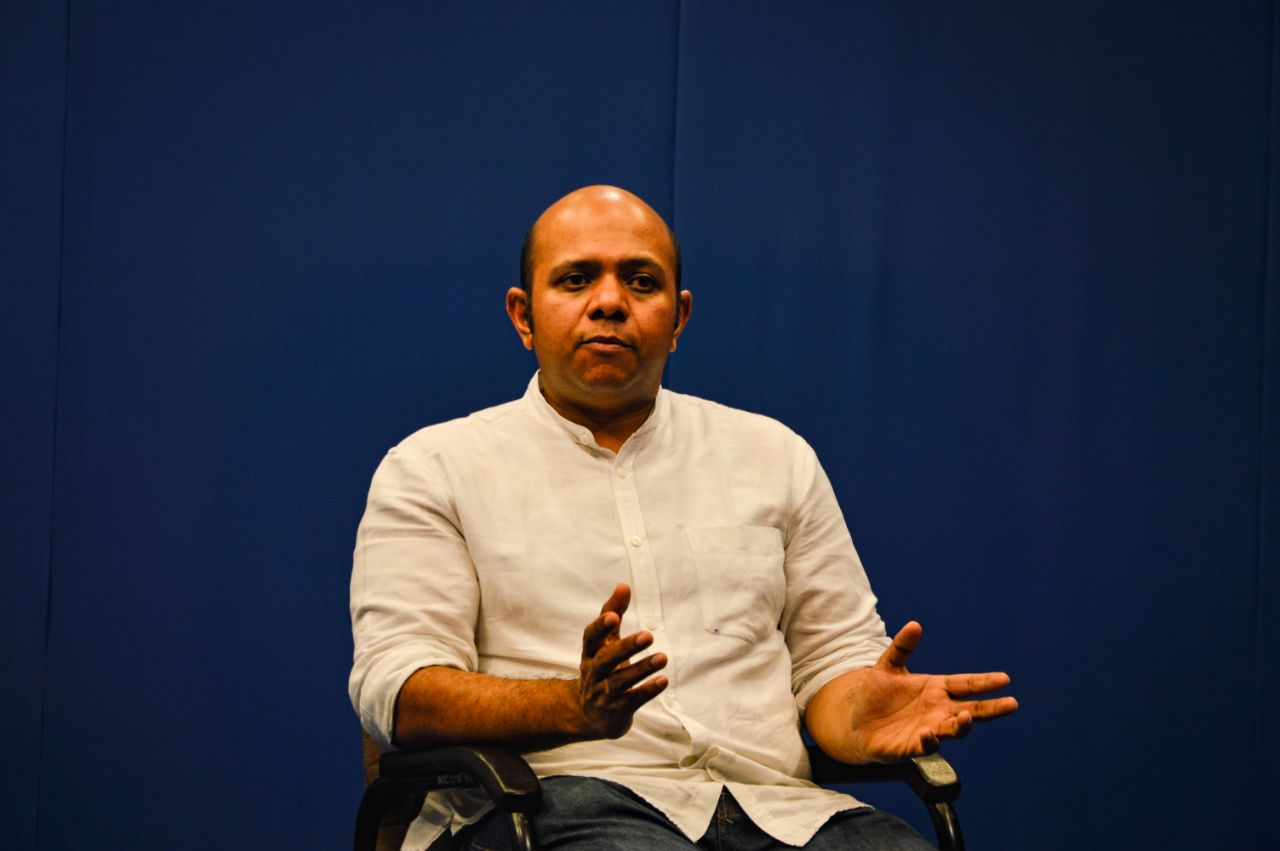
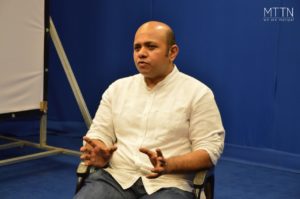
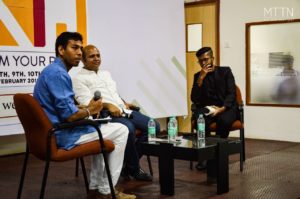
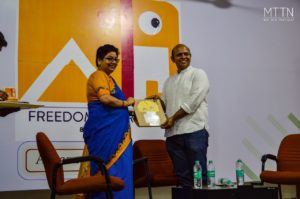
Leave a Reply
You must be logged in to post a comment.